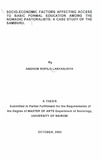| dc.description.abstract | The purpose of this thesis was to examine factors affecting access to basic
formal education among the nomadic pastoralists in Kenya and the Samburu
were taken as a case study. The need for the study arose from the fact that
despite education being one of the basic human rights and an empowerment
prerequisite, its accessibility among nomadic pastoralists has remained low.
Notwithstanding, Kenya has formal education as a priority in her policies.
However, despite primary schools Gross Enrollment Rates in Kenya
reaching95%, in some nomadic pastoral areas like Samburuit was 41.3%,
and as low as 25% for Wajir, 1989 (Kenya pastoralists Forum: 1995; Abagi:
1997)It was in the light of the above scenario, that this study came up with the
objectives of generally to determine factors affecting access to basic formal
education among the nomadic pastoralists .Specifically to determine the
factors that affect access to basic formal education in Samburu district and
secondly to establish whether the different agro-ecological zones and
regions vis-a-vis Urban, Lowland-Rural and Highland-Rural impact differently
on access to basic formal education among the Samburu. The study
therefore tested the following three hypotheses. One, that, Facility specific
factors, (such as cost of education, distance to School),affect access to
basic formal education among the nomadic pastoralists. Two, background
factors, (such as sex of the child, domestic work done by children, mobility
of the household, perceived importance of formal education by
parents/guardians, occupation of guardian, guardian's education, parental
participation in school), influence access of children to basic formal education in Sarnburu District. Three agro-ecological zones and regions
(Highland-Rural, Lowland-Rural, and Urban),impaGt differently on access to
basic formal education among the nomadic pastoral Samburu.
To facilitate the data collection, Samburu District was stratified into three
clusters - Highland-Rural, Lowland-Rural and Urban. From each of the
clusters random sampling was applied to select one division, one location,
one sub-location and then 200 household heads from all the villages in the
sub-location. Data were collected and analyzed using Excel and SPSS
computer packages and further presented using descriptive and inferential
statistics. The specific tools used were, frequencies, cross tabulations,
contingency tables, chi-square, multiple regression, correlation, and
qualitative presentation in form of quotations and photographs.
There were several findings of the study relating to policy issues in the
education sector. First, the study findings reveal that facility specific factors,
such as distance and cost were the main factors affecting access to basic
formal education 'in Samburu district and by implication other nomadic
pastoral areas. As a result, the study recommends that more schools are
availed in nomadic pastoral areas, promoting other alternative forms of
education, development of the nomadic people's economic resource livestock
and subsidizing the cost of schooling is recommended.Further, the study revealed that background factors of respondents like domestic work, gender, guardian's education level and occupation, and mobility of the household, influence access to basic formal education among the Samburu. Accordingly, the study recommends that gender, child rights, and entrepreneurship awareness creation be enhanced. More so, the
development of infrastructures like health, and access roads and curbing the
insecurity problem in nomadic pastoral areas is recommended.
Finally,the study results revealed that agro-ecological zones/regions impact
differ,ently on access to basic formal education in Samburu district. For
instance mobility and distance were particular to the Lowland-Rural. As a
result, the study recommends that interventions geared to enhancing
education access in nomadic pastoral areas need to take cognizance of the
differential needs and problems of different areas. | en |

